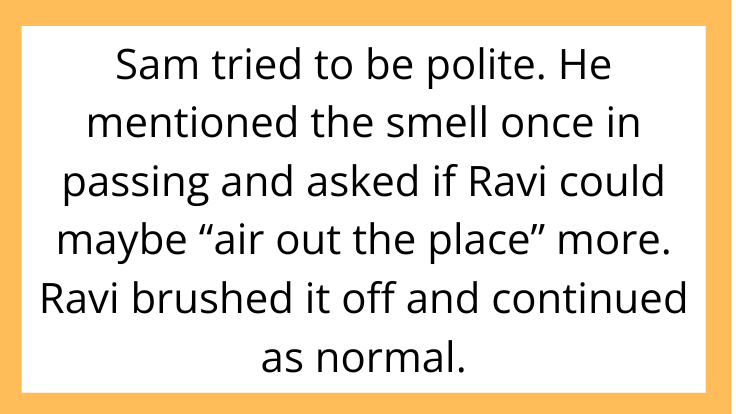AITAH for Telling My Roommate to Stop Cooking Smelly Food in Our Shared Apartment?
Living with roommates can be a great way to save money—but it also comes with challenges, especially when personal habits start clashing. In today’s AITAH scenario, we explore a case where food, culture, and boundaries collide in a shared living space.
Let’s dig into this spicy situation.
The Conflict: Aromas vs. Agreements

A 25-year-old man—let’s call him Sam—posted on Reddit’s r/AITAH community about an awkward but escalating issue with his roommate, Ravi.
According to Sam, Ravi recently started cooking more frequently—mainly traditional South Asian dishes like curries, lentils, and sautéed spices. The meals, while flavorful, left a lingering smell in the apartment that Sam said “made it hard to breathe or relax.”
Sam tried to be polite. He mentioned the smell once in passing and asked if Ravi could maybe “air out the place” more. Ravi brushed it off and continued as normal.
Things came to a head when Sam brought friends over one evening, and one of them joked about the apartment “smelling like a spice shop.” Embarrassed, Sam confronted Ravi again, more directly this time. He told him to “stop cooking stuff that makes the whole place reek.”
Ravi got defensive, saying Sam was being culturally insensitive. He explained that this was his traditional cuisine, and he wasn’t doing anything wrong by cooking food he enjoys.
Sam, feeling unheard, turned to Reddit to ask: AITAH for telling my roommate to stop cooking smelly food?
The Clash: Cultural Respect vs. Personal Comfort

The Case for Sam: Shared Space, Shared Responsibility
From Sam’s perspective, he isn’t trying to be rude—he’s just struggling to live in a space that constantly smells in a way he finds overwhelming. He’s not asking Ravi to stop eating what he wants—just to be more mindful.
He lives there too, and smells that linger for hours or even days make the place feel less like home. As someone who didn’t grow up around strong spices or intense aromas, he may be particularly sensitive.
Plus, Sam says he tried to handle it maturely, but Ravi ignored his concerns. So who’s really being inconsiderate?
The Case for Ravi: Food Is Culture, Not Just Preference
Ravi, on the other hand, views cooking as more than just meal prep—it’s culture, identity, and comfort. Being told his food is “smelly” or that he should stop cooking it altogether likely feels deeply personal and offensive.
He’s not violating any lease rules or doing anything objectively wrong. He pays rent, uses his own groceries, and follows safety protocols. Why should his diet be policed?
In Ravi’s eyes, the comment wasn’t about smells—it was about judgment.
Reddit Responds: The Internet Is Torn

Reddit’s verdict was surprisingly nuanced.
Many agreed that Sam had a right to his comfort, especially if the smell was overpowering and affecting his mental space.
But others strongly sided with Ravi, pointing out that calling cultural food “smelly” can be microaggressive, even if unintentionally so.
One user wrote:
“You’re not the villain for struggling with strong smells. You ARE the villain if you expect someone to erase their culture for your comfort.”
Another user suggested compromise:
“Invest in a good air purifier. Ask him to open windows or light candles—not to erase himself.”
How to Navigate Cultural Clashes in Shared Living

1. Use Neutral Language
Avoid loaded words like “gross” or “reek.” Instead, try “I’m really sensitive to strong smells—can we find a way to manage this together?”
2. Offer Solutions, Not Ultimatums
Suggest specific compromises: better ventilation, cooking during certain hours, or using a window fan. This signals a desire to collaborate, not control.
3. Acknowledge Culture
Recognize that food is personal. Validating your roommate’s perspective can ease defensiveness and lead to more productive conversations.
4. Create a Shared Living Agreement
If this continues to be a problem, draft a roommate agreement. It can include quiet hours, cleaning schedules, and yes—even cooking habits.
So, Was Sam the Villain?

It depends on your lens.
If you value personal comfort and believe shared spaces require compromise, Sam’s frustration is understandable. But if you prioritize cultural sensitivity and believe roommates should be free to be themselves in their own homes, Ravi’s response makes sense too.
Maybe Sam isn’t a villain—but he did miss a chance to be more compassionate in his approach.



